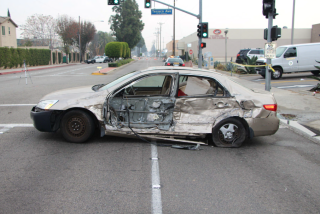Jury Awards Knott Family $7.5 Million : Courts: But blame is laid at the feet of Peyer, not CHP, and slain woman’s parents are unlikely to see any of the money.
- Share via
The family of Cara Knott, a college student murdered during a 1986 traffic stop by former CHP Officer Craig Peyer, was awarded $7.5 million in damages Wednesday, but the California Highway Patrol was cleared of any responsibility in the killing.
Although the award was significant, the 9-3 verdict returned by a Superior Court jury was a setback to Knott’s family. Sam and Joyce Knott, who filed the civil lawsuit on their daughter’s behalf, were hoping the CHP would be found negligent for hiring Peyer, 40, and failing to adequately supervise him.
The jury’s findings rejected the family’s argument that CHP officials and Peyer’s supervisors were also culpable for Knott’s death through their inadequate supervision. Jurors also rejected an argument that Peyer’s supervisors should have known that he presented a danger to the public because of several complaints they received about him from female motorists.
Instead, the jury found Peyer wholly responsible for Knott’s death. The chances of the Knotts recovering any money from him “are somewhere around zero,” said Brian Monaghan, the family’s attorney. Peyer’s homeowner’s policy has an exclusion clause for intentional acts, Monaghan added.
Monaghan had asked the jury to find the CHP responsible for most of the damages. He appeared dejected as the jury returned its verdict.
“I’m stunned. Every expert testified they (CHP) were negligent, including their own expert,” he said during a brief interview outside the courtroom.
Deputy state Atty. Gen. Randall Christison, who represented the CHP at the monthlong trial, said he was not surprised by the jury’s findings. In his closing statement Monday, Christison asked jurors to find Peyer responsible for 99% of the damages.
“The CHP is an exceptional organization of very honorable people doing a good job. Peyer’s deed was one of the darkest days in the history of the CHP,” he said.
Peyer, who was a patrol officer for 13 years, is the first CHP officer ever convicted of murder while on duty. He was convicted of first-degree murder on June 22, 1988, and is serving 25 years to life in state prison. Knott, 20, was strangled the night of Dec. 27, 1986, at the Mercy Road off-ramp on Interstate 15.
Sam and Joyce Knott said they were not pursuing the lawsuit to profit from their daughter’s death. Any money awarded to them would be donated to a crime victims fund and used to establish a scholarship in Cara’s memory for students wishing to become schoolteachers. The young woman was a student at San Diego State University and planned to become an elementary schoolteacher.
“We’re simply dumbfounded. The money thing was a non-issue,” Joyce Knott said. “The only thing we were after is to change the CHP’s system. We wanted certain safeguards instituted so what happened to our daughter will not happen to another young woman. That’s what we were fighting for.”
Sam Knott expressed anger and frustration over the verdict.
“The whole scope of the trial was to bring attention to the practice and guidelines of the CHP and the lack of supervision for their officers,” he said. “It is very sad and disheartening for us.”
Juror Robert Davis, who voted with the majority, said most jurors agreed with the Knotts that CHP officers need more supervision. However, Davis also said that jurors who voted with him believed that Peyer’s supervisors followed CHP procedures in place at the time and had no reasonable way of knowing that Peyer would turn out to be a killer.
“We agreed with the Knott family. If the CHP would require their personnel to call dispatch every time they stop a car, stop to render assistance or to put a ticket on a car parked on the (freeway) shoulder, that would be more than adequate supervision for any officer,” said Davis, a supermarket produce manager.
“We found fault with the CHP system. . . . Officers were practically unsupervised once they leave on their beat,” he said. “They don’t have to check in with dispatchers at any time and are not tracked to their location. . . . However, the fault was not with the supervisors, but with the CHP system.”
Another juror, Deanna Stevens, said jurors extensively reviewed the CHP policy manual and complaint guidelines. In addition, jurors carefully studied Peyer’s job evaluations and tickets he gave in the months preceding Knott’s death.
“We went by the CHP complaint guidelines and put ourselves in the position of Peyer’s supervisors. The fact is that Peyer was a good cop. His supervisors couldn’t have known that he was going to kill somebody. We also read over the entire manual and found that his supervisors didn’t do anything wrong,” said Stevens, an administrative assistant at an auto dealership.
During his 13-year career as a CHP officer, Peyer had a reputation for issuing more traffic tickets than most patrol officers. He was known as “a hot pencil,” averaging 200 to 250 tickets a month, while other officers wrote 90 to 100.
More to Read
Sign up for Essential California
The most important California stories and recommendations in your inbox every morning.
You may occasionally receive promotional content from the Los Angeles Times.










